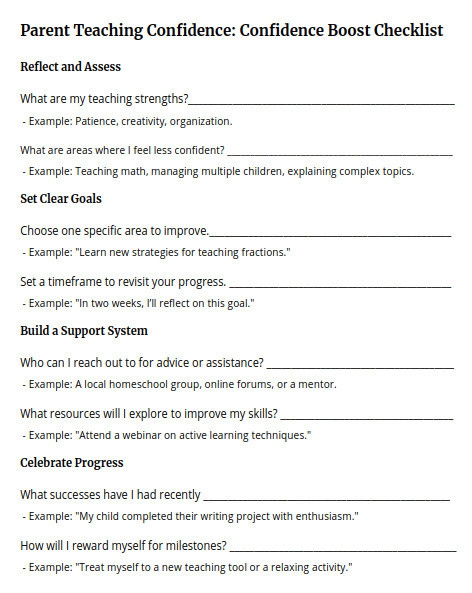Building Confidence as a Homeschool Teacher

Introduction
Homeschooling can be a daunting task, especially when doubts creep in about your teaching abilities. As a parent who homeschooled seven children across three continents, I understand the challenges—and the rewards. This guide will help you recognize your strengths, identify areas for growth, and give you practical tools to boost your confidence as a homeschool teacher. Remember, you are uniquely qualified to teach your children, and with the right mindset, resources, and support, you can thrive in this role.
Understanding Your Role as a Homeschool Parent
You do not need a teaching degree to be a great homeschool educator. What you need is:
- A Willingness to Learn: Like your children, you’ll grow and improve with time.
- Passion for Your Child’s Success: Your care and dedication make a huge impact.
- Flexibility and Adaptability: Every day won’t go as planned, but that’s okay.
Common Fears and How to Overcome Them
1. I am not qualified enough.
- Reality: You do not have to know everything. With resources like curriculum guides, online courses, and support groups, help is always available.
- Action Tip: Pick one area to improve at a time—whether it’s math techniques or writing instruction.
2. What if I fail my child?
- Reality: Children are resilient, and learning is a cumulative process.
- Action Tip: Focus on daily progress instead of perfection. Celebrate small victories.
3. I don’t know where to start.
- Reality: There are structured plans and plenty of experienced homeschoolers to guide you.
- Action Tip: Start with one subject or skill and build from there. Don’t overwhelm yourself.
Strategies to Build Teaching Confidence
1. Prepare and Plan
- Start each school year with clear goals and a curriculum outline.
- Use a planner to track weekly objectives and progress.
- Prioritize resources that align with your child’s learning style.
2. Embrace Flexibility
- Adjust teaching methods when something isn’t working.
- Be open to feedback from your children—it’s valuable.
3. Connect with Others
- Join homeschool support groups, both local and online.
- Attend homeschool conventions or workshops to gain insights and inspiration.
4. Celebrate Milestones
- Recognize achievements, whether it’s finishing a project or mastering a skill.
- Keep a journal of your successes to reflect on during tough times.
Printable Worksheet: Confidence Boost Checklist
Use this worksheet to track your confidence-building journey.
This single-page printable allows you to assess your strengths, set actionable goals, and reflect on your progress over time.
Final Thoughts
Teaching confidence doesn’t come overnight, but with time and persistence, you’ll grow into a capable and inspiring educator for your children. You’ve already taken the first step by choosing to homeschool, and that decision speaks volumes about your dedication. Trust yourself, lean into your community, and remember—homeschooling is as much about your growth as it is your child’s.

